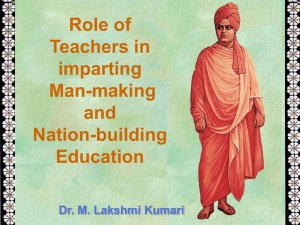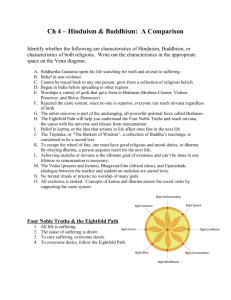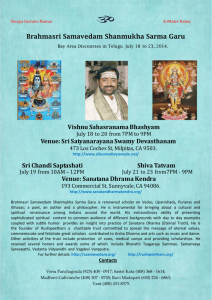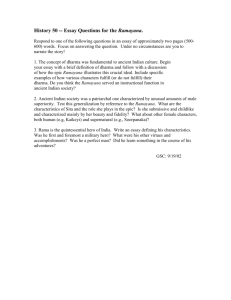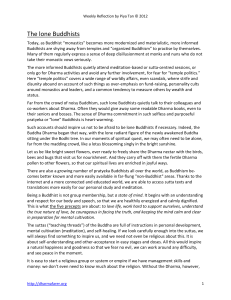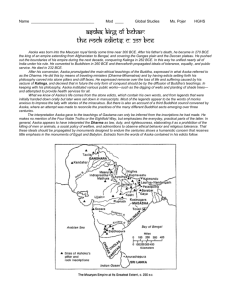Chapter 6 Rock and Pillar Edicts Asoka
advertisement
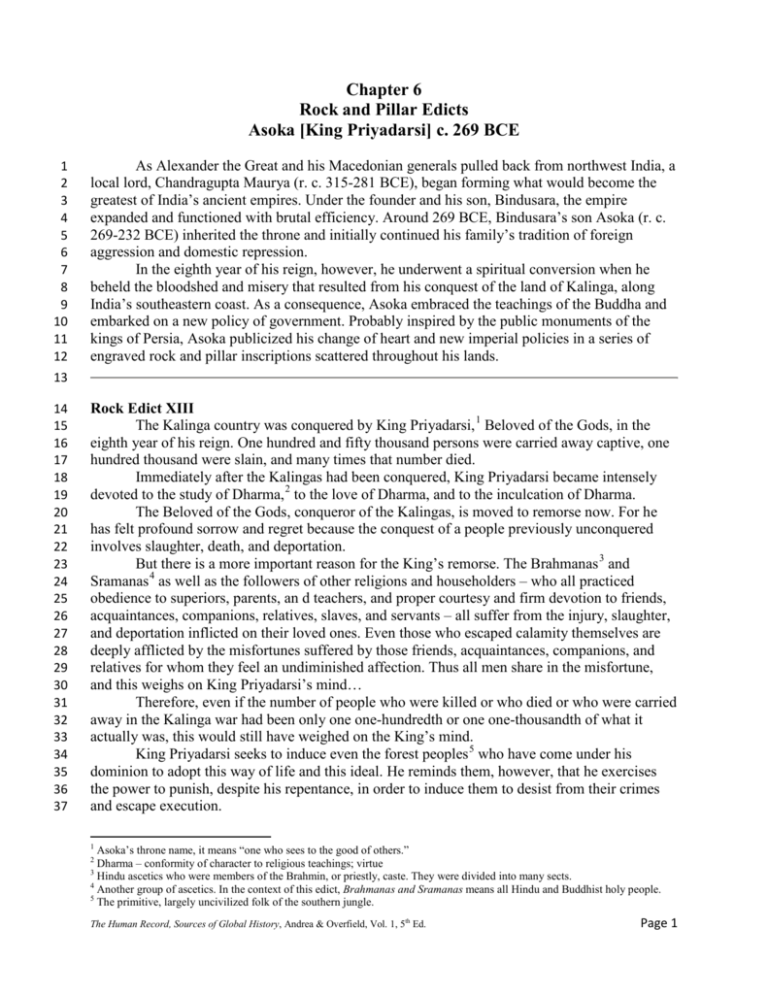
Chapter 6 Rock and Pillar Edicts Asoka [King Priyadarsi] c. 269 BCE 1 2 3 4 5 6 7 8 9 10 11 12 As Alexander the Great and his Macedonian generals pulled back from northwest India, a local lord, Chandragupta Maurya (r. c. 315-281 BCE), began forming what would become the greatest of India’s ancient empires. Under the founder and his son, Bindusara, the empire expanded and functioned with brutal efficiency. Around 269 BCE, Bindusara’s son Asoka (r. c. 269-232 BCE) inherited the throne and initially continued his family’s tradition of foreign aggression and domestic repression. In the eighth year of his reign, however, he underwent a spiritual conversion when he beheld the bloodshed and misery that resulted from his conquest of the land of Kalinga, along India’s southeastern coast. As a consequence, Asoka embraced the teachings of the Buddha and embarked on a new policy of government. Probably inspired by the public monuments of the kings of Persia, Asoka publicized his change of heart and new imperial policies in a series of engraved rock and pillar inscriptions scattered throughout his lands. 13 14 15 16 17 18 19 20 21 22 23 24 25 26 27 28 29 30 31 32 33 34 35 36 37 Rock Edict XIII The Kalinga country was conquered by King Priyadarsi, 1 Beloved of the Gods, in the eighth year of his reign. One hundred and fifty thousand persons were carried away captive, one hundred thousand were slain, and many times that number died. Immediately after the Kalingas had been conquered, King Priyadarsi became intensely devoted to the study of Dharma, 2 to the love of Dharma, and to the inculcation of Dharma. The Beloved of the Gods, conqueror of the Kalingas, is moved to remorse now. For he has felt profound sorrow and regret because the conquest of a people previously unconquered involves slaughter, death, and deportation. But there is a more important reason for the King’s remorse. The Brahmanas 3 and Sramanas 4 as well as the followers of other religions and householders – who all practiced obedience to superiors, parents, an d teachers, and proper courtesy and firm devotion to friends, acquaintances, companions, relatives, slaves, and servants – all suffer from the injury, slaughter, and deportation inflicted on their loved ones. Even those who escaped calamity themselves are deeply afflicted by the misfortunes suffered by those friends, acquaintances, companions, and relatives for whom they feel an undiminished affection. Thus all men share in the misfortune, and this weighs on King Priyadarsi’s mind… Therefore, even if the number of people who were killed or who died or who were carried away in the Kalinga war had been only one one-hundredth or one one-thousandth of what it actually was, this would still have weighed on the King’s mind. King Priyadarsi seeks to induce even the forest peoples 5 who have come under his dominion to adopt this way of life and this ideal. He reminds them, however, that he exercises the power to punish, despite his repentance, in order to induce them to desist from their crimes and escape execution. 1 Asoka’s throne name, it means “one who sees to the good of others.” Dharma – conformity of character to religious teachings; virtue 3 Hindu ascetics who were members of the Brahmin, or priestly, caste. They were divided into many sects. 4 Another group of ascetics. In the context of this edict, Brahmanas and Sramanas means all Hindu and Buddhist holy people. 5 The primitive, largely uncivilized folk of the southern jungle. 2 The Human Record, Sources of Global History, Andrea & Overfield, Vol. 1, 5th Ed. Page 1 1 2 3 4 5 6 7 8 9 10 11 12 13 14 15 16 17 18 19 20 21 22 23 24 25 26 27 28 29 30 31 32 33 34 35 36 37 38 39 40 41 42 43 For King Priyadarsi desires security, self-control, impartiality, and cheerfulness for all living creatures. King Priyadarsi considers moral conquest the most important conquest. He has achieved this moral conquest repeatedly both here and among the peoples living beyond the borders of his kingdom, even as far away as six hundred yojanas, 6 where the Yona [Greek] king Antiyoka 7 rules, and even beyond Antiyoka I the realms of the four kings named Turamaya, Antikini, Maka, and Alikasudara, and to the south among the Cholas and Pandyas 8 as far as Ceylon. 9 Here in the King’s dominion also, . . .everywhere people heed his instructions in Dharma. Even in countries which King Priyadarsi’s envoys have not reached, people have heard about Dharma and about his Majesty’s ordinances and instructions in Dharma, and they themselves conform to Dharma and will continue to do so. Wherever conquest is achieved by Dharma, it produces satisfaction. Satisfaction is firmly established by conquest by Dharma. Even satisfaction, however, is of little importance. King Priyadarsi attaches value ultimately only to consequences of action in the other world. This edict on Dharma has been inscribed so that my sons and great-grandsons who may come after me should not think new conquests worth achieving. If they do conquer, let them take pleasure in moderation and mild punishments. Let them consider moral conquest the only true conquest. This is good, here and hereafter. Let their pleasure be pleasure in morality. For this alone is good, here and hereafter. Pillar Edict VII King Priyadarsi, the Beloved of the Gods, speaks as follows: . . . Whatever good deeds I have done the people have imitated, and they have followed them as a model. In doing so, they have progressed and will progress in obedience to parents and teachers, in respect for elders, in courtesy to priests and ascetics, to the poor and distressed, even to slaves and servants. . . The people can be induced to advance in Dharma by only two means, by oral prescriptions and by meditation. Of the two, moral prescriptions are of little consequence, but meditation is of great importance. The moral prescriptions I have promulgate include rules making certain animals inviolable, 10 and many others. But even in the case of abstention from injuring and from killing living creatures, it is by meditation that people have progressed in Dharma most. This edict on Dharma has been inscribed in order that it may endure and be followed as long as my sons and great-grandsons shall reign and as long as the sun and moon shall shine. For one who adheres to it will attain happiness in this world and hereafter. . . This edict on morality should be engraved wherever stone pillars or stone slabs are available, in order that it may endure forever. 6 About 3,000 miles. Antiochus II Theos (r. 261-246 BCE), a member of the Macedonian family of Seleucus and king of Syria. 8 People of the southern tip of India. 9 The major island off the southeast coast of India; today it is the nation of Sri Lanka. 10 Certain animals are not to be harmed. 7 The Human Record, Sources of Global History, Andrea & Overfield, Vol. 1, 5th Ed. Page 2 1 2 3 4 5 6 7 8 9 10 11 12 13 14 15 16 17 18 19 20 21 22 23 24 25 26 27 28 29 30 31 32 33 34 35 36 37 38 39 40 41 42 Pillar Edict II King Priyadarsi says: Dharma is good. But what does Dharma consist of? It consists of few sins and many good deeds, of kindness, liberality, truthfulness, and purity. I have bestowed even the gift of spiritual insight on men in various ways. I have decreed many kindnesses, including even the grant of life, to living creatures, two-footed and four-footed as well as birds and aquatic animals. I have also performed many other good deeds. I have ordered this edict on Dharma to be inscribed in order that people may act according to it and that it may endure for a long time. And he who follows it completely will do good deeds. Rock Edict IX King Priyadarsi, the Beloved of the Gods, says: The ceremony11 of Dharma is not limited to time. Even if it does not achieve its object in this world, it produces unlimited merit in the next world. But if it produces its object in this world, it achieves both effects: the purpose desired in this world and unlimited merit in the next. It has also been said that liberality12 is commendable. But there is no greater liberality than the gift of Dharma or the benefit of Dharma. Therefore, a friend, well-wisher, relative, or companion should urge one when the occasion arises, saying, “You should do this; this is commendable. By doing this you may attain Heaven.” And what is more worth doing than attaining Heaven? Rock Edict VII King Priyadarsi wishes members of all faiths to live everywhere in his kingdom. For they will seek mastery of the senses and purity of mind. Men are different in their inclinations and passions, however, and they may perform the whole of their duties or only part. Even if one is not able to make lavish gifts, mastery of the sense, purity of mind, gratitude, and steadfast devotion are commendable and essential. Pillar Edict IV Impartiality is desirable in legal procedures and in punishments. I have therefore decreed that henceforth prisoners who have been convicted and sentence to death shall be granted a respite of three days. During this period their relatives may appeal to the officials for the prisoners’ lives; or, if no one makes an appeal, the prisoners may prepare for the other world by distributing gifts or by fasting. For I desire that, when the period of respite has expired, they may attain happiness in the next world, and that various ways of practicing Dharma by self-control and the distribution of gifts may be increased among the people. 11 Ceremony should be understood in a metaphorical sense – the good works of Dharma as encapsulated in the Holy Eightfold Path. 12 Generosity. The Human Record, Sources of Global History, Andrea & Overfield, Vol. 1, 5th Ed. Page 3

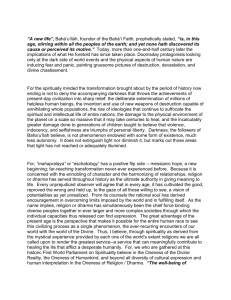
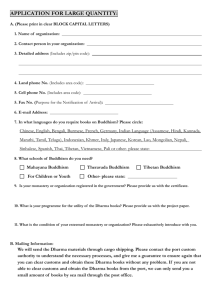
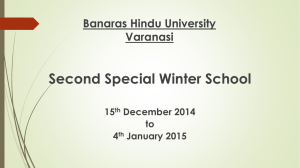
![[#SEAD-614] Create Project Space for Moore Lab Group](http://s3.studylib.net/store/data/007834021_2-e246955aacca9cfb92a906a1234e44a5-300x300.png)
